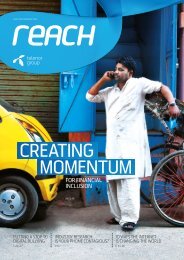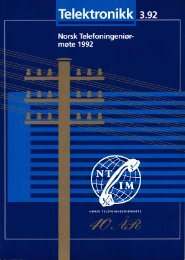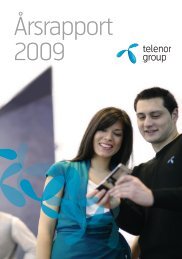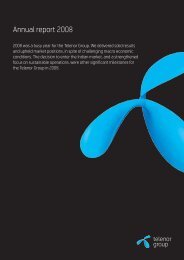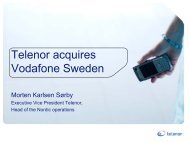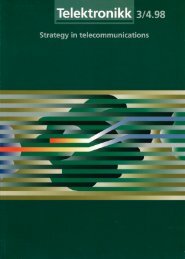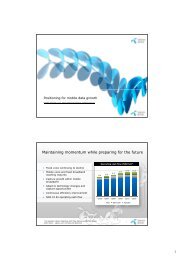You also want an ePaper? Increase the reach of your titles
YUMPU automatically turns print PDFs into web optimized ePapers that Google loves.
Figure 2 Needs and<br />
Related Services of<br />
young people<br />
132<br />
In general At home Moving about Free time At school<br />
Privacy/<br />
Independence<br />
To be cool,<br />
trendy<br />
Communication<br />
Diversion<br />
Efficient and<br />
fun learning<br />
Complete<br />
homework<br />
Complement<br />
learning<br />
The Location information itself enhances many<br />
applications, such as the so-called “Lifestyle<br />
Mobility Services”:<br />
• “Find the next” Applications – Restaurant,<br />
Pub;<br />
• Offers a huge range, as Travel Information or<br />
Route Planning;<br />
• Developing of innovative Applications –<br />
Friend Finder;<br />
• Supports specialised “community interest”<br />
applications.<br />
A common complaint from users is that while<br />
it is wonderful to be able to access all kinds of<br />
information on-line, it is not so wonderful when<br />
an enquiry or search turns up over a thousand<br />
hits, many of which are irrelevant. Over the<br />
mobile network, where bandwidth is a scarce<br />
and expensive resource, this is an even more<br />
pressing issue. Location dependence allows<br />
information to be targeted more precisely.<br />
The above mentioned services are important for<br />
users because they offer more relevant personal<br />
information. Businesses and individuals are<br />
becoming increasingly reliant on electronic<br />
access and delivery of information to improve<br />
their efficiency and quality of life. Furthermore,<br />
there is a huge potential to generate additional<br />
revenues for service operators, e.g. through<br />
advertising and subscription. One can think of<br />
many other examples combining personalisation<br />
and location awareness that could exploit this<br />
approach for a wide range of users. One obvious<br />
area is tourism where it may be used to create<br />
services for tourists providing information on<br />
places of interest near them based on the preferences<br />
in their profile and their current location.<br />
Be entertained, games<br />
Financials<br />
Shopping<br />
Emotional<br />
support<br />
Finding friends<br />
Mixing with<br />
the group<br />
Hang around and relax<br />
To be up to date: local news, party information<br />
and information on teens´ problems<br />
Latest news<br />
from school<br />
Efficient and<br />
fun learning<br />
Source: TIMElabs/Diebold<br />
This information can be presented with appropriate<br />
multimedia clips (based on their interests)<br />
and directions on how to get there.<br />
In general, location based services will offer a<br />
lot of opportunities, but to implement security/<br />
privacy aspects is a crucial point for the expectancy<br />
by the customer.<br />
To fill these gaps the project will develop technologies<br />
for an open active mobile multimedia<br />
service using the Mobile Service Platform. These<br />
services will include the following features:<br />
• Sensing of and smart interaction with other<br />
devices in the user’s environment;<br />
• Personalisation and adaptation of services,<br />
user awareness;<br />
• Integration of location aware services.<br />
Afterwards the prototypical services will be validated<br />
in a Norwegian Field trial with a suitable<br />
test community of young people. The results of<br />
the trials will be evaluated, and success will be<br />
assessed in terms of the response of the young<br />
people who participate and the use that they<br />
make of the services.<br />
Conclusion<br />
In this paper we have argued that location-aware<br />
services will play a particularly important role in<br />
providing services for mobile users.<br />
All enabling positioning technologies have<br />
drawbacks, either of cost, complexity or accuracy.<br />
We assume that a combination of a satellite<br />
based system like GPS and a flavour of a network-based<br />
positioning determining systems<br />
will establish a “hybrid solution” which is able<br />
to provide location information anywhere.<br />
Telektronikk 1.2001



